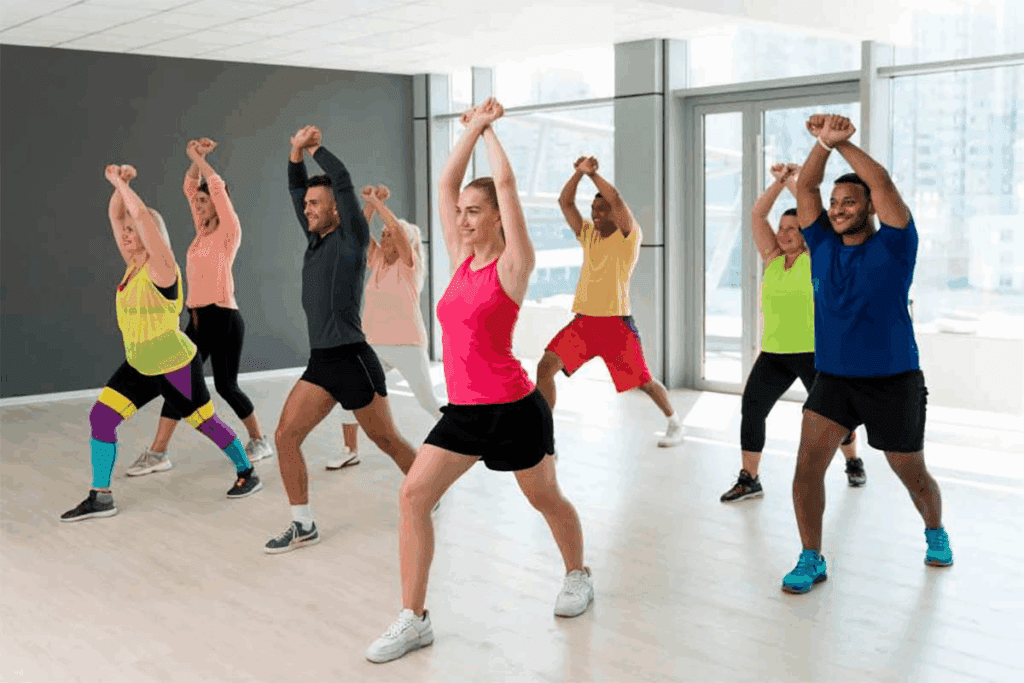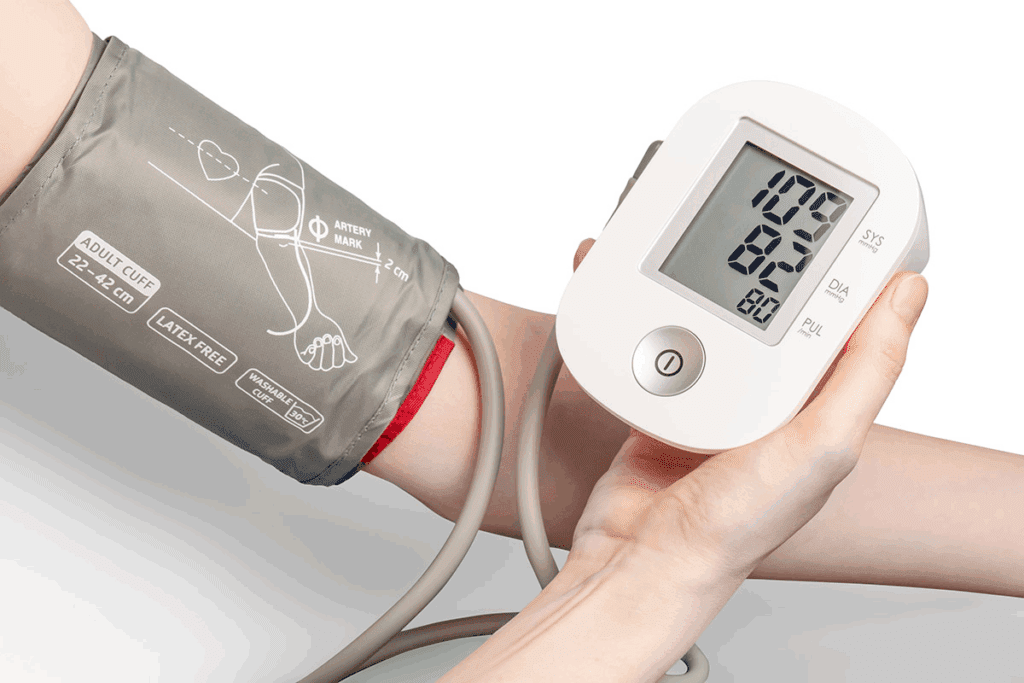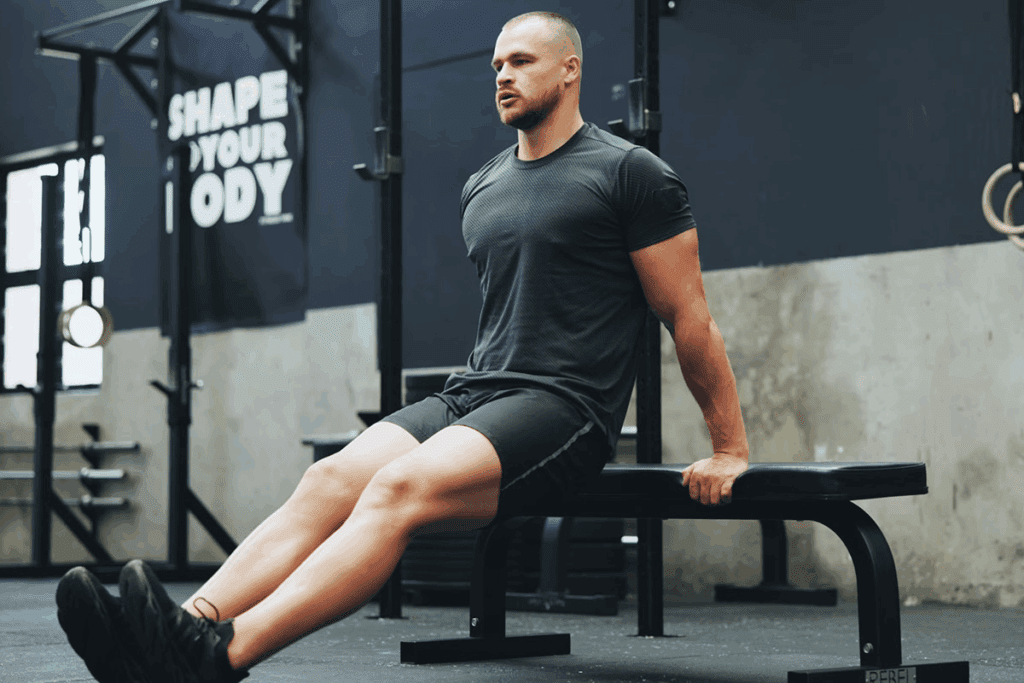
Regular physical activity is key for a healthy life. Aerobic exercises are great because they keep your heart rate up and work big muscle groups. They use oxygen for energy. Explore aerobic exercise examples, quick list of exercises suitable for every fitness level.
At Liv Hospital, we know how important personalized fitness plans are. That’s why we’ve put together a list of 15 aerobic exercise examples for everyone. You can try brisk walking, cycling, swimming, jogging, or group fitness classes. They fit different tastes and goals.
Doing these activities can make your heart healthier, increase your stamina, and lower disease risks. Our list aims to kickstart your fitness journey, no matter where you are now.

Aerobic exercise is key to staying fit. It means doing activities that make your heart beat faster and help your body use more oxygen. It’s great for your health and keeps you feeling good.
Cardio training makes your heart stronger and helps your body carry oxygen better. This improves your heart health, boosts your stamina, and helps you burn calories. Aerobic activity uses big muscles in rhythmic movements, like walking or cycling, for a long time.
As the American Heart Association emphasizes, regular aerobic exercise lowers heart disease, stroke, and diabetes risks. It’s good for your body and mind, reducing stress and anxiety.
“Regular physical activity is one of the most important things you can do for your health. It’s linked to a lower risk of many chronic diseases, including heart disease, diabetes, and some cancers.”
Adults should do at least 150 minutes of moderate-intensity aerobic activity each week. This can be 30 minutes a day, five days a week. If you want to get fitter, try harder activities or longer sessions.
Experts say adults 18 to 64 should do 150 minutes of moderate activity weekly. Or, 75 minutes of vigorous activity, or a mix of both. It’s also good to do muscle-strengthening activities two or more times a week.
Adding aerobic exercise to your life can greatly improve your health and happiness. Find activities you like, like walking, cycling, or swimming, and do them regularly.

Aerobic exercise is great for your heart, mind, and stamina. It’s key to a healthy life, boosting your quality of life in many ways.
Aerobic workouts make your heart and lungs stronger. This improves your heart and lung health. Regular aerobic exercise can also lower blood pressure and improve oxygen and nutrient delivery to your body.
| Health Benefit | Description | Impact |
| Improved Heart Health | Strengthens the heart, improving circulation | Reduces risk of heart disease |
| Enhanced Respiratory Function | Increases lung capacity and efficiency | Boosts endurance and reduces fatigue |
| Better Cardiovascular Endurance | Improves the body’s ability to transport oxygen | Enhances overall physical fitness |
Aerobic exercise helps with weight control by burning calories and building muscle. It also improves metabolic health, lowering the risk of type 2 diabetes and metabolic syndrome. By adding aerobic exercise to your routine, you can keep a healthy weight and lower disease risks.
Aerobic exercise is good for your mind too. It can lessen anxiety and depression, improve mood, and boost brain function. Aerobic exercise may even help prevent cognitive decline and dementia.
Knowing the many benefits of aerobic exercise helps you choose to be active. This choice can greatly improve your health and happiness.
Aerobic exercises are key for heart health, mood, and energy. They suit everyone, from beginners to pros. Let’s dive into various activities for different goals and tastes.
Walking is easy and accessible. It’s perfect for starting your fitness journey. You don’t need any special gear and can walk almost anywhere.
Brisk walking is faster and better for your heart. Try to walk quickly but can talk while doing it.
Running and jogging are great for a heart-pumping workout. They mainly work your legs but also engage your core and arms. Running is faster, giving a more intense workout.
Both are great for heart health and calorie burn.
Swimming is gentle on your joints, perfect for those with joint problems or recovering from injuries. It works many muscles at once, giving a full-body workout. You can swim at different speeds, from easy to intense.
Cycling is versatile, done indoors or outdoors. It’s great for heart health and leg strength. Indoor cycling, like on a spin bike, is popular for staying fit indoors.
These examples show the wide range of aerobic exercises for all fitness levels. Adding these to your routine can boost your health and happiness.
Aerobic exercise includes many activities for everyone. You can choose from low-impact or high-intensity workouts. This variety helps you reach your fitness goals.
Rowing is a aerobic activity that works many muscles. It’s low-impact, perfect for those who need to protect their joints. You can find rowing machines in gyms or row outdoors on lakes or rivers.
Elliptical training is a low-impact exercise that feels like running but is easier on your joints. It’s great for improving your heart health without the risk of injury from high-impact activities.
Stair climbing is a strong aerobic exercise for your legs and glutes. You can use a stairmaster at the gym or climb real stairs. It boosts your heart health and strengthens your lower body.
Hiking is a great way to enjoy nature while getting a workout. You can pick trails that match your fitness level. Hiking combines heart health with strength training as you tackle different terrains.
These kinds of aerobic exercise offer variety and fit different fitness levels. They help improve your heart health, manage weight, and boost mental well-being. By adding these activities to your routine, you can enjoy these benefits.
Group fitness aerobic activities are fun and engaging. They help improve your heart health. Exercising with others boosts motivation and makes it more enjoyable.
These activities are for all fitness levels. So, everyone can join in and see benefits.
Zumba and dance classes are energetic and fun ways to boost heart health. They mix dance with aerobic exercise for a full-body workout. Zumba is great for those who love dancing and want to improve their rhythm and coordination.
Zumba classes are lively and engaging. They use different music styles to keep the workout interesting and dynamic.
Spinning and group cycling classes offer an intense cardiovascular workout. They use stationary bikes and can be adjusted for different fitness levels. Group cycling is excellent for strengthening legs and improving heart health.
Spinning classes often include interval training. This boosts metabolism and calorie burn. The group setting also creates a sense of community and friendly competition.
Aerobic step and HIIT (High-Intensity Interval Training) classes are high-energy workouts. Aerobic step classes use a step platform for aerobic movements. This improves coordination and strength.
HIIT classes involve short, intense exercises followed by brief rests. We suggest HIIT for those wanting a quick, effective workout. These classes are great for heart health and calorie burning.
In conclusion, group fitness activities like Zumba, spinning, and HIIT offer many options. They help improve heart health in a fun, social setting.
For those new to exercise, beginner-friendly aerobic workouts offer a gentle start to fitness. These exercises are low-impact, which means they’re easy on the body. They’re perfect for anyone, no matter their fitness level.
Walking is a great way to begin an exercise routine. It’s low-impact and can be done almost anywhere. Start with short walks and slowly increase the time and pace.
| Week | Duration | Intensity |
| 1-2 | 15 minutes | Leisurely |
| 3-4 | 30 minutes | Brisk |
| 5+ | 45+ minutes | Very Brisk |
Water-based exercises are great for beginners. They’re low-impact and gentle on the joints. Perfect for those with joint pain or mobility issues. Try water aerobics or swimming laps for a fun workout.
Low-impact dance routines are fun and engaging. They can be adjusted for different fitness levels. Many gyms offer dance classes that are perfect for beginners.
Adding these beginner-friendly aerobic workouts to your routine can boost your heart health. It also increases energy and overall well-being.
Looking to improve your heart health without too much effort? Moderate-intensity aerobic training is perfect. It offers a good mix of challenge and endurance for all fitness levels.
Power walking boosts your walk’s intensity without needing to run. Walk briskly, using your arms and legs to move you. Keep your back straight and core tight for better results.
Here are some tips to enhance your power walk:
Recreational cycling is a great way to get fit while having fun. To maximize your cycling benefits, try these strategies:
Ride at a pace where you can talk but are working hard. Mix up your route with hills or different resistance levels to keep it interesting.
Circuit training combines aerobic exercises done one after another with little rest. It’s great for boosting heart health and burning calories. You might do jumping jacks, burpees, or mountain climbers in a circuit.
Start with 5-7 exercises for your circuit. Do each for 30-60 seconds, then rest for 15-30 seconds. Do the circuit 2-3 times, resting 1-2 minutes between each round.
Looking to take your fitness to the next level? High-intensity aerobic exercises are a great choice. They boost your heart health, increase endurance, and help burn calories.
Sprint Training and Intervals are top picks for better aerobic fitness. Short, intense runs can greatly improve your heart health. Try sprinting at full speed for 20-30 seconds, then jog slowly for 1-2 minutes.
Swimming is great for those who need to ease the pressure on their joints. Advanced swimming includes interval training. Swim fast for a set distance or time, then rest.
| Workout Type | Description | Benefits |
| Interval Training | Swim at high intensity for 25 yards, rest for 15 seconds | Improved endurance, increased caloric burn |
| Distance Swimming | Swim continuously for 500 yards at a moderate pace | Enhanced cardiovascular fitness, improved muscular endurance |
Plyometric exercises, or jump training, are high-intensity and effective. Try jump squats, box jumps, and burpees. They boost your heart health and muscle power.
Start with easier versions of these exercises and get tougher as you get fitter. For example, start with squat jumps and move to box jumps.
Adding these exercises to your routine can really boost your fitness. You’ll see better heart health, endurance, and overall fitness.
An effective aerobic exercise routine mixes different cardio activities and plans for increasing intensity. This method helps avoid plateaus and prevents injuries. It ensures you keep getting better and improving.
It’s key to balance different cardio activities for a complete routine. You can mix high-impact activities like running with low-impact ones like cycling. Swimming or rowing are also great options.
By trying various cardio exercises, you can:
| Cardio Activity | Impact Level | Caloric Burn |
| Running | High | 600-800 calories/hour |
| Cycling | Low-Moderate | 400-600 calories/hour |
| Swimming | Low | 450-700 calories/hour |
Increasing the intensity of your workouts is vital for better aerobic fitness. This means making your exercises more challenging over time.
Strategies for progressive intensity planning include:
Adding strength training to your aerobic routine boosts fitness and health. This mix helps balance your cardiovascular fitness and muscle strength.
Benefits of combining aerobic exercise with strength training include:
Adding aerobic exercise to your daily routine can greatly improve your health and wellbeing. Knowing the benefits of regular aerobic exercise helps you make better lifestyle choices. This is the first step towards a healthier, more active you.
Regular aerobic exercise can lower the risk of chronic diseases and boost mental health. We’ve looked at various aerobic exercises, like walking, running, swimming, and cycling. These activities suit different fitness levels. By choosing exercises you enjoy, you can make aerobic exercise a lasting part of your life.
To make aerobic exercise a part of your life, start with achievable goals and a routine that fits you. Mix different cardio exercises with strength training for the best results. Regular aerobic activity improves heart health and boosts energy levels.
We urge you to start today and make aerobic exercise a daily habit. With regular practice and patience, you can achieve a healthier, more balanced lifestyle. Enjoy the many benefits of adding aerobic exercise to your daily routine.
Aerobic exercise makes your heart rate go up. It boosts your heart and lung health by getting more blood and oxygen to your muscles.
Aerobic exercises include walking, running, swimming, and cycling. Rowing, elliptical training, stair climbing, and hiking are also good options.
Aim for at least 150 minutes of moderate-intensity aerobic exercise weekly. Or, do 75 minutes of vigorous-intensity aerobic exercise for better health.
Regular aerobic activity improves your heart and lung health. It helps with weight management and boosts your mood. It also lowers the risk of chronic diseases.
Yes, beginners can start with walking, water-based exercises, or low-impact dance routines. These are easy on your body.
Mix different cardio types and increase intensity gradually. Add strength training to your routine for a well-rounded workout.
Moderate-intensity exercises, like brisk walking, raise your heart rate and improve health. High-intensity exercises, like sprinting, push your heart rate to its highest.
Yes, you can do bodyweight exercises, jumping jacks, and dance at home. You don’t need much equipment.
You can see aerobic exercise benefits in just a few weeks. You’ll notice improvements in heart health, weight, and mood.
Yes, aerobic exercise helps with weight loss. It’s effective when combined with a healthy diet.
Yes, group fitness classes like Zumba and spinning are great. They provide a fun and motivating environment to stay on track with your workout.
Subscribe to our e-newsletter to stay informed about the latest innovations in the world of health and exclusive offers!
WhatsApp us